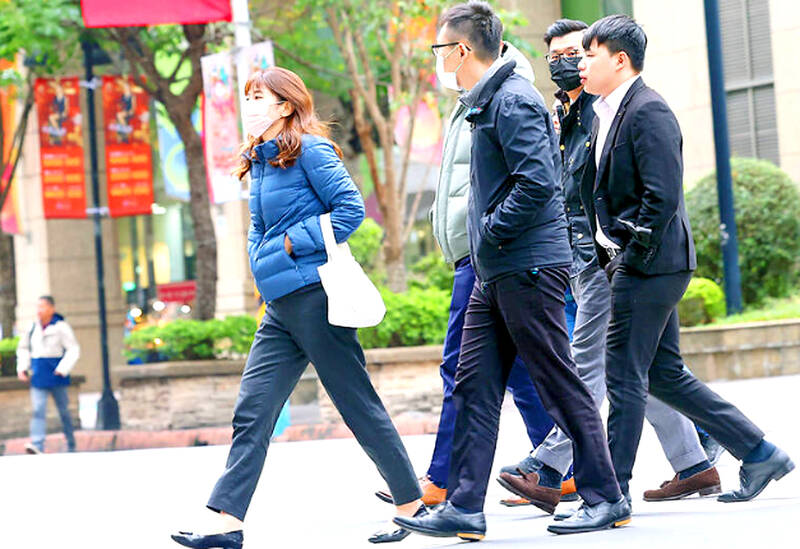The gender pay gap in Taiwan last year was 15.8 percent, slightly higher than the 15.1 percent in 2023, Ministry of Labor data showed yesterday.
The average hourly wage for males last year was NT$389, compared with NT$327 for women, meaning that woman on average would have needed to work 58 more days than males to make the same annual salary, up two days from 2023, the ministry said in a report.
The pay gap was a result of several factors, including the nature of the occupations typically dominated by one sex, as well as seniority, education and qualifications trends, the report said.

Photo courtesy of the Workforce Development Agency via CNA
The widening of the pay gap last year was greatly influenced by a few major industries with wide pay gaps, including the electronic components manufacturing industry, which had an average wage of NT$668 per hour among males and NT$393 among women, it said, adding that the gap was 41.2 percent, 1.9 percentage points higher than 2023.
The gap also widened in the food and healthcare sectors, which could be due to how positions are distributed in the industries and differences in raises, the report said.
Excluding the electronic components, food and healthcare industries, the wage gap last year was 11.5 percent, 0.3 percentage points higher than in 2023, it said.
Taiwan’s gender wage gap remained lower than in Japan and South Korea, which in 2023 reported 29.7 percent and 29 percent respectively, it added.

The manufacture of the remaining 28 M1A2T Abrams tanks Taiwan purchased from the US has recently been completed, and they are expected to be delivered within the next one to two months, a source said yesterday. The Ministry of National Defense is arranging cargo ships to transport the tanks to Taiwan as soon as possible, said the source, who is familiar with the matter. The estimated arrival time ranges from late this month to early next month, the source said. The 28 Abrams tanks make up the third and final batch of a total of 108 tanks, valued at about NT$40.5 billion

Two Taiwanese prosecutors were questioned by Chinese security personnel at their hotel during a trip to China’s Henan Province this month, the Mainland Affairs Council (MAC) said yesterday. The officers had personal information on the prosecutors, including “when they were assigned to their posts, their work locations and job titles,” MAC Deputy Minister and spokesman Liang Wen-chieh (梁文傑) said. On top of asking about their agencies and positions, the officers also questioned the prosecutors about the Cross-Strait Joint Crime-Fighting and Judicial Mutual Assistance Agreement, a pact that serves as the framework for Taiwan-China cooperation on combating crime and providing judicial assistance, Liang

A group from the Taiwanese Designers in Australia association yesterday represented Taiwan at the Midsumma Pride March in Melbourne. The march, held in the St. Kilda suburb, is the city’s largest LGBTQIA+ parade and the flagship event of the annual Midsumma Festival. It attracted more than 45,000 spectators who supported the 400 groups and 10,000 marchers that participated this year, the association said. Taiwanese Designers said they organized a team to march for Taiwan this year, joining politicians, government agencies, professionals and community organizations in showing support for LGBTQIA+ people and diverse communities. As the first country in Asia to legalize same-sex

MOTIVES QUESTIONED The PLA considers Xi’s policies toward Taiwan to be driven by personal considerations rather than military assessment, the Epoch Times reports Chinese President Xi Jinping’s (習近平) latest purge of the Chinese People’s Liberation Army (PLA) leadership might have been prompted by the military’s opposition to plans of invading Taiwan, the Epoch Times said. The Chinese military opposes waging war against Taiwan by a large consensus, putting it at odds with Xi’s vision, the Falun Gong-affiliated daily said in a report on Thursday, citing anonymous sources with insight into the PLA’s inner workings. The opposition is not the opinion of a few generals, but a widely shared view among the PLA cadre, the Epoch Times cited them as saying. “Chinese forces know full well that